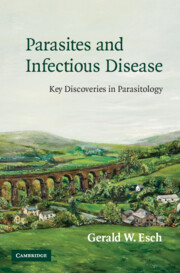Book contents
- Frontmatter
- Contents
- Preface
- Prologue
- 1 African trypanosomes and their VSGs
- 2 Malaria: the real killer
- 3 The HIV–AIDS vaccine and the disadvantage of natural selection: the yellow fever vaccine and the advantage of artificial selection
- 4 Lyme disease: a classic emerging disease
- 5 The discovery of ivermectin: a ‘crapshoot’, or not?
- 6 “You came a long way to see a tree”
- 7 Infectious disease and modern epidemiology
- 8 The ‘unholy trinity’ and the geohelminths: an intractable problem?
- 9 Hookworm disease: insidious, stealthily treacherous
- 10 The spadefoot toad and Pseudodiplorchis americanus: an amazing story of two very aquatic species in a very dry land
- 11 The schistosomes: split-bodied flukes
- 12 Dicrocoelium dendriticum and Halipegus occidualis: their life cycles and a genius at work
- 13 Trichinosis and Trichinella spp. (all eight of them, or is it nine?)
- 14 Phylogenetics: a contentious discipline
- 15 Toxoplasma gondii, Sarcocystis neurona, and Neospora caninum: the worst of the coccidians?
- Summary
- Index
- References
2 - Malaria: the real killer
Published online by Cambridge University Press: 24 November 2009
- Frontmatter
- Contents
- Preface
- Prologue
- 1 African trypanosomes and their VSGs
- 2 Malaria: the real killer
- 3 The HIV–AIDS vaccine and the disadvantage of natural selection: the yellow fever vaccine and the advantage of artificial selection
- 4 Lyme disease: a classic emerging disease
- 5 The discovery of ivermectin: a ‘crapshoot’, or not?
- 6 “You came a long way to see a tree”
- 7 Infectious disease and modern epidemiology
- 8 The ‘unholy trinity’ and the geohelminths: an intractable problem?
- 9 Hookworm disease: insidious, stealthily treacherous
- 10 The spadefoot toad and Pseudodiplorchis americanus: an amazing story of two very aquatic species in a very dry land
- 11 The schistosomes: split-bodied flukes
- 12 Dicrocoelium dendriticum and Halipegus occidualis: their life cycles and a genius at work
- 13 Trichinosis and Trichinella spp. (all eight of them, or is it nine?)
- 14 Phylogenetics: a contentious discipline
- 15 Toxoplasma gondii, Sarcocystis neurona, and Neospora caninum: the worst of the coccidians?
- Summary
- Index
- References
Summary
Open your mouth: this will shake your shaking …
If all the wine in my bottle will recover him, I will help his ague.
The Tempest, William Shakespeare (1564–1616)Since I have never had malaria, all I know about rigor, or the high fever that follows, is what I read from those who have had the experience. Not long ago, in preparing to write this essay, I spent some time interviewing Robert Desowitz, the American parasitologist who has so marvelously written about his many experiences working with tropical diseases over the years, e.g., The Malaria Capers, Who Gave Pinta to the Santa Maria, etc. I asked Bob if, while living so long in so many exotic parts of the world, he had ever come down with malaria, or any of the other tropical diseases about which he had written so much or done so much research. He said that he had not been infected with anything except Plasmodium vivax and Plasmodium falciparum, that both of them came at the same time, and by accident! Acquiring malaria by accident is ironic in his case because he had spent nine years at the West African Trypanosome Research Lab in Jos, in the northern part of Nigeria, working on trypanosomes in the employ of the British Colonial Service. He then spent five more years as Chairman of the Department of Parasitology at the University of Singapore, plus several more years in southeastern Asia while with the U.S. Army at their SEATO (Southeast Asia Treaty Organization) lab in Bangkok, Thailand.
- Type
- Chapter
- Information
- Parasites and Infectious DiseaseDiscovery by Serendipity and Otherwise, pp. 128 - 149Publisher: Cambridge University PressPrint publication year: 2007



